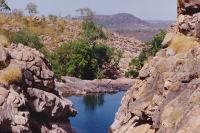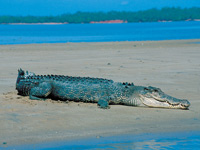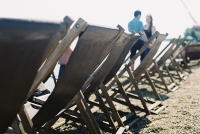Darwin Travel Guide
The city of Darwin, capital of the Northern Territory, presides loftily over the top end of Australia. Set on a rocky peninsula that stretches into one of the most beautiful natural harbours on the north Australian coast, the city is surrounded by water on three sides, which allows it to be fanned by cool breezes that temper the tropical heat and humidity of its climate.
Darwin has survived destruction three times: the city was hit by a cyclone in 1893; it was then bombed by the Japanese in 1942 during World War II; and more recently, in 1974, Cyclone Tracy levelled the city on Christmas Eve. It is a tribute to the pioneering spirit of its cosmopolitan population of 87,000 that it has not only overcome these calamities, but gone on to thrive.
The city is compact, and the areas of most interest to tourists are easy to explore on foot. The tropical climate encourages outdoor living and simply strolling through the leafy streets, browsing art galleries and enjoying refreshments at sidewalk cafes, is a pleasure for visitors. Shady parks can be found behind busy shopping streets and are a delight with exotic flowering trees like frangipani, banyan and tamarind.
Darwin is a youthful, tropical city, small enough to feel friendly and relaxed, and a great travel hub for exploring the incredible natural wonders on the city's doorstep.
Things to do in Darwin
The Tour Tub, an open-air bus, is a good way to tour Darwin and view its major attractions, which include the Museum and Art Gallery of the Northern Territory, the Overland Telegraph Museum, Fannie Bay Gaol, the Botanic Gardens, the Australian Pearling Exhibition, and East Point Military Museum. The Deckchair Cinema is a delight for night-time entertainment, and animal-lovers will be fascinated by the enormous Crocodylus Park and Zoo, which is home to more than a thousand crocs and numerous other animals.
The city is a good base from which to explore the surrounding national parks, and although Darwin is a charming place, most visitors spend more time exploring the celebrated landscapes just beyond the city. The most famous of these is the Kakadu National Park, which is a UNESCO World Heritage Site. Other very popular daytrips from Darwin include visits to Katherine Gorge, Litchfield National Park, and the Corroboree Billabong.

Kakadu National Park
This stunning park, covering almost 12,500 square miles (32,375 sq km) was added to UNESCO's list of World Heritage areas in 1984 and is regarded as one of the natural marvels of Australia. The land itself is believed to be more than two billion years old, and is a jigsaw of wetlands, gorges, waterfalls, floodplains, rainforest pockets and escarpments.
It offers the visitor an impressive variety of superb landscapes teeming with wildlife, and features some of Australia's most magnificent examples of Aboriginal rock art. About 5,000 Aboriginal sites have been identified in the park area, making it arguably the best destination in Australia for those wanting to experience the oldest living culture on earth. The park can be visited on a day-trip from Darwin and contains more than 1,600 species of plants and 500 different kinds of birds and animals.

Crocodylus Park and Zoo
Housing over three decades of research on Australian crocodiles and a comprehensive crocodile museum, not to mention more than a thousand resident crocodiles, the Crocodylus Park and Zoo is designed to educate people about this lesser known predator. While the focus at the park is on crocodiles, there are plenty of other animals to keep visitors interested. At this, the largest attraction in Darwin, visitors can learn about these reptiles as well as view a collection of other animals such as big cats, monkeys, birds, snakes and turtles, to name a few. Regular daily tours, including crocodile feeding sessions, will captivate visitors. There are well-trained guides who are willing to answer any questions about the dinosaur-like creatures, both the species in general and the particular crocodiles housed at the park. Visitors are allowed to get as close as is safe to get the best pictures possible.

Deckchair Cinema
Operated by the Darwin Film Society and completely independent, the Deckchair Cinema is unique in more than one way. Screening mainly films that would otherwise be unavailable to local audiences, the Deckchair Cinema is set outdoors on the edge of Darwin Harbour and is the perfect location for a sunset picnic followed by a movie. The cinema usually operates seven nights a week during the dry season (April to November) and screens a range of movies from family friendlies to foreign films. With 250 deckchairs and about 100 straight-backed seats, the cloudless skies above the Deckchair Cinema and harbour lights make a breath-taking backdrop for the screen. An evening at the Deckchair Cinema makes for a unique way to experience Darwin and its beautiful outdoors.
Getting Around
The Darwin bus network covers most of the attractions in the city and many of the routes run seven days a week, although there are reduced operating hours on Sundays and public holidays. Fares are on a zone system. Darwin also has a number of bicycle trails and from the city there are easy rides to picturesque destinations such as Fannie Bay or the Botanical Gardens. Taxis are available and are metered. However, central Darwin is small enough to get around on foot.
Darwin Climate and Weather
Darwin has a tropical savannah climate and experiences distinct wet and dry seasons but fairly consistent temperatures year-round. The dry season is almost always rain free and extends from May to October, with hot, sunny days becoming cooler in the evenings. The weather during these months is pleasant and consistent. The wet season, from November to April, brings high humidity and slightly higher temperatures, resulting in electric storms in the afternoon that leave the countryside lush and green. The average temperatures range between 68°F (20°C) and 91°F (33°C) all year.
Australia travel info
Electricity
Electrical current is 230 volts, 50Hz. Three-pin flat blade plugs are used but are different to those in most other countries, so an adapter is normally required.
Language
English is the official language of Australia.
Money
The unit of currency is the Australian dollar (AUD), which is divided into 100 cents. Credit cards are widely accepted and ATMs are freely available throughout the country. Banks and bureaux de change exchange most foreign currencies. Banking hours are generally 9.30am to 4pm, Monday to Thursday, and 9.30am to 5pm on Friday, but some banks offer extended hours and some are open on Saturday mornings.
Tipping
Most service providers in Sydney don't expect a tip, so travellers shouldn't feel pressured into giving one. A tip of 10 percent is standard in restaurants, however, and passengers usually round up to the nearest dollar or more in taxis.
Health
A yellow fever vaccination certificate is required by travellers over one year of age arriving within six days of having stayed overnight or longer in an infected country. No other special immunisations or medications are required for most trips to Australia; however, insect repellents are strongly advised because of the risk of mosquito-borne illnesses. Another health risk is sunburn, and visitors are advised to take precautions. Medical services are excellent but can be expensive, so travellers should ensure that they have adequate insurance. Australia has a reciprocal health agreement with the United Kingdom providing for free hospital emergency medical treatment; proof of UK residence is required.
Safety
The crime rate in Australia is low; however, travellers should be aware that tourists could be targeted by petty criminals. Visitors should be vigilant about personal possessions and travel documents, particularly in popular tourist destinations such as along the Gold Coast. Tropical cyclones normally occur between November and April in some parts of Australia, particularly in Western Australia, Queensland and the Northern Territory. There is a serious risk of bush fires in summer (November to March), especially in Victoria, Tasmania, New South Wales and ACT. Also during the summer months, the shallow coastal waters of northern Australia and Queensland become infested with marine stingers, commonly known as box jellyfish, whose sting is highly dangerous and can be deadly. Visitors should pay attention to signs on beaches and follow the instructions of local lifeguards to avoid injury.
Local customs
Generally an informal attitude, in dress and behaviour, prevails in most social and business situations. Sport, particularly rugby and cricket, is almost a religion in Australia.
Doing business
Those doing business in Australia are sure to find that the friendly yet professional corporate atmosphere of the country will provide them with an exciting opportunity to develop their careers. The business culture of Australia is a bit of a hybrid breed, incorporating the trappings of British formality and conservatism, the egalitarian ethos of Scandinavian countries, and the dynamic, innovative approach to business that is generally thought of as American in origin - rounded out, of course, with typical Australian warmth and humour. The approach to management in Australia is consultative, pragmatic, and strictly non-hierarchical. Those in positions of relative power are accorded respect by virtue of their personal qualities, not simply because they happen to be the boss.
Business etiquette in Australia further reflects this egalitarian ethos. Business people should use titles initially, though they will almost certainly be told to dispense with them and refer to their colleagues by their first names. They should maintain eye contact when speaking to their associates, as this is regarded as a sign of forthrightness and trustworthiness, qualities that Australian business people tend to favour over showiness, self-aggrandisement or empty promises. Business meetings in Australia should be scheduled about a week in advance, and then confirmed a few days before they are due to take place.
Colleagues should be punctual, as lateness can be seen as a symptom of flakiness or indifference. Business meetings in Australia do not generally proceed from a set agenda. Rather, they are viewed as open forums, in which ideas are to be debated and discussed. In fact, over-preparing for a meeting can make participants seem pushy, as though they wish to bully others into adopting their opinions on the issue at hand. The dress code for business in Australia remains surprisingly traditional: dark suits and ties are the norm for men; for women, business suits, worn either with pants or a skirt. As a general rule, business people should avoid loud jewellery and accessories, as to Australian eyes they might make them seem arrogant. The official language of business in Australia is English, and business hours are generally from 8.30am (or 9am) to 5pm (or 5.30pm), Monday to Friday.
Duty free
Travellers to Australia over 18 years do not have to pay customs duty on 2.25 litres of alcohol; and 25 cigarettes or 25g of cigars or tobacco products. All tobacco products in travellers' baggage are included in this category, regardless of where they were purchased. Gifts are included in the A$900 duty-free allowance. Fresh produce and animal or plant products are prohibited.
Communications
The international dialling code for Australia is +61. Hotels, cafes and restaurants offering free WiFi are widely available; purchasing a local prepaid SIM card can be a cheaper option than paying international roaming costs, which can be quite high.
Passport & Visa
A valid passport and a visa or ETA is required for travel to Australia. An ETA is an electronically issued and verified visa, not visible in a passport. ETAs are issued to passengers travelling for touristic or business purposes. Tourist ETAs are usually valid for three months. ETAs are obtainable online at: www.eta.immi.gov.au or through most travel agents. It is highly recommended that passports are valid six months after departure from a holiday destination.
Entry requirements
US nationals must have a valid passport on arrival. A pre-obtained Electronic Travel Authority (ETA) is required for stays of up to three months.
UK nationals must have a passport valid for intended period of stay. A pre-arranged Electronic Travel Authority (ETA) is required for stays of up to three months.
Canadian nationals require a passport valid for intended period of stay. A pre-arranged Electronic Travel Authority (ETA) is required for stays of up to three months.
South African nationals must have a passport valid for at least six months after their date of departure. A visa is required.
Irish nationals must have a passport that is valid on arrival. A pre-arranged Electronic Travel Authority (ETA) is required for stays up to three months.
New Zealanders require a valid passport on entry to Australia. A Special Category Visa (SCV) is issued on arrival after completing a passenger card.
Useful contacts
Australian Tourist Commission, Sydney: +61 (0)2 9360 1111 or www.australia.com
Emergencies: 000 (112 on cellphones)Embassies / consulates in other countries
Embassy of Australia, Washington DC, United States: +1 202 797 3000.
Australian High Commission, London, United Kingdom: +44 (0)20 7379 4334.
Australian High Commission, Ottawa, Canada: +1 613 236 0841.
Australian High Commission, Pretoria, South Africa: +27 (0)12 423 6000.
Australian Embassy, Dublin, Ireland: +353 (0)1 664 5300.
Australian High Commission, Wellington, New Zealand: +64 (0)4 473 6411.
Embassies / consulates in Australia
Embassy of the United States, Canberra: +61 (0)2 6214 5600.
British High Commission, Canberra: +61 (0)2 6270 6666.
Canadian High Commission, Canberra: +61 (0)2 6270 4000.
South African High Commission, Canberra: +61 (0)2 6272 7300.
Embassy of Ireland, Canberra: +61 (0)2 6214 0000.
New Zealand High Commission, Canberra: +61 (0)2 6270 4211.



